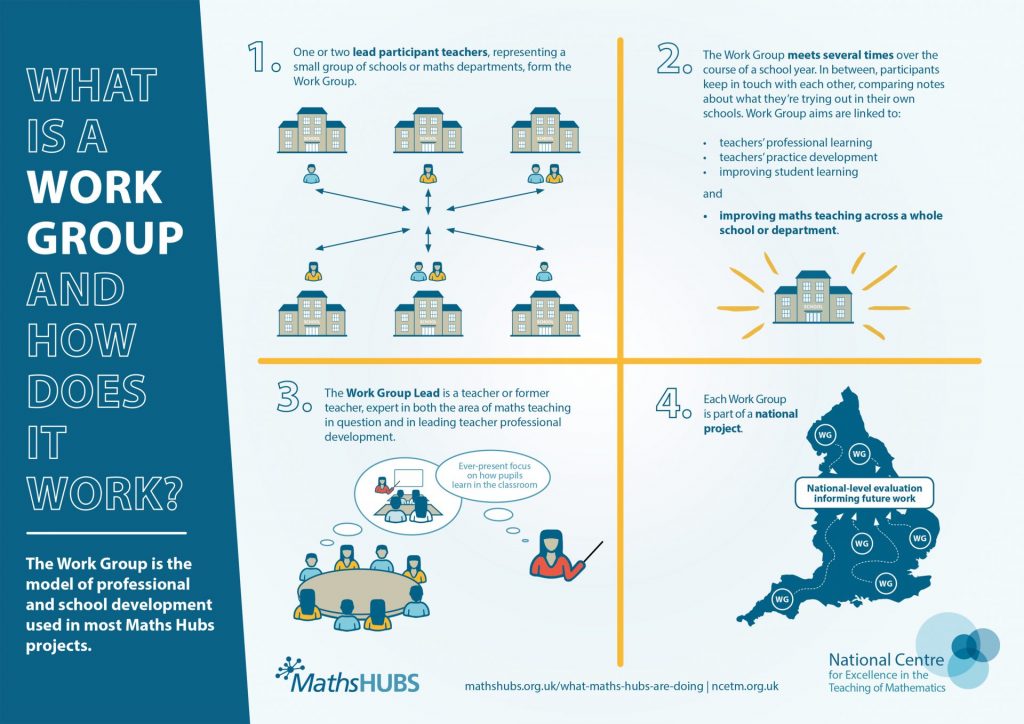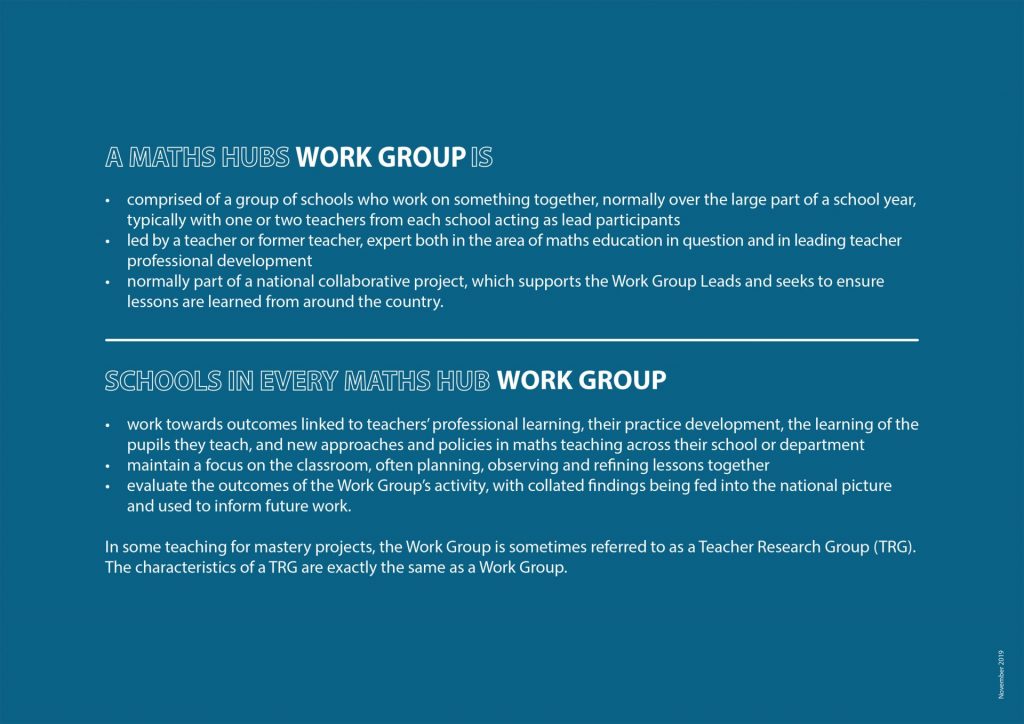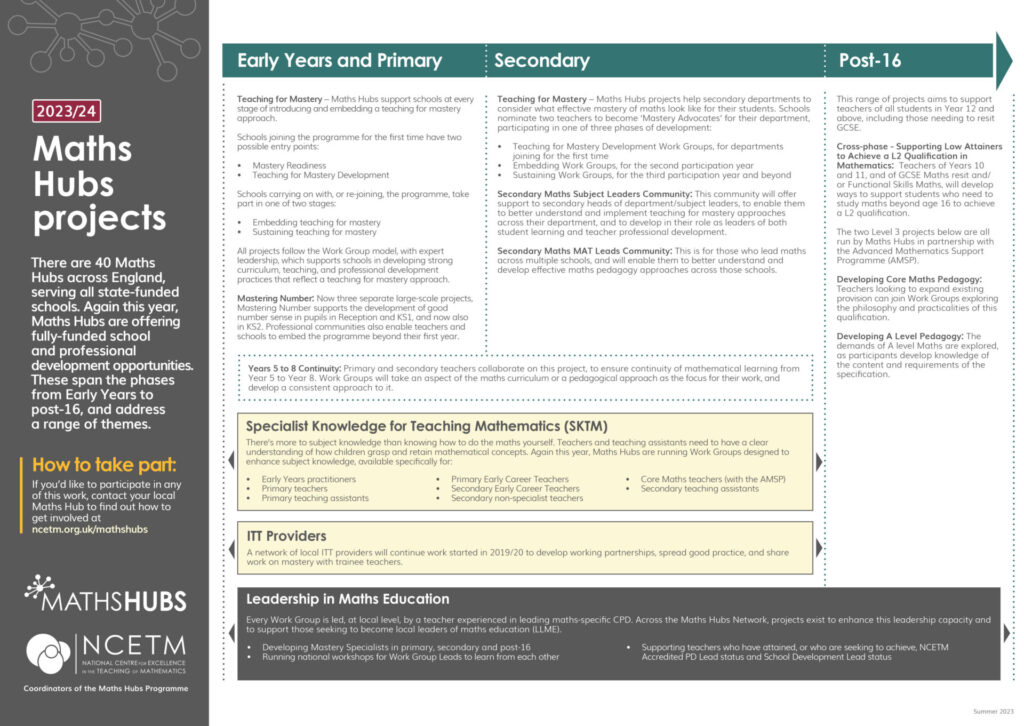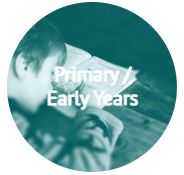Work Groups
The Work Group is the model of professional and school development used in many Maths Hubs projects. It underlines, and makes real, the ‘C’ in teachers’ CPD.
Implicit in the Work Group’s timeline is also the space and opportunity for participant teachers to influence and lead change in their own schools or departments. The diagram goes into more detail (click/tap diagram to show a larger version):
Overview of a Work Group
- One or two lead participant teachers, representing a small group of schools or maths departments, form the Work Group.
- The Work Group meets several times over the course of a school year. This could be face-to-face or online. In between, participants keep in touch with each other, comparing notes about what they’re trying out in their own schools. Work Group aims are linked to:
- teachers’ professional learning
- teachers’ practice development
- improving student learning
- improving maths teaching across a whole school or department
- The Work Group Lead is a teacher or former teacher, expert in both the area of maths teaching in question and in leading teacher professional development.
- Each Work Group is part of a national project.
A Work Group is:
- comprised of a group of schools who work on something together, normally over the large part of a school year, typically with one or two teachers from each school acting as lead participants
- led by a teacher or former teacher, expert both in the area of maths education in question and in leading teacher professional development
- normally part of a national network collaborative project (NCP), which supports the Work Group Leads and seeks to ensure lessons are learned from around the country.
Schools in every Work Group:
- work towards outcomes linked to teachers’ professional learning, their practice development, the learning of the pupils they teach, and new approaches and policies in maths teaching across their school or department
- maintain a focus on the classroom, often planning, observing and refining lessons together
- evaluate the outcomes of the Work Group’s activity, with collated findings being fed into the national picture and used to inform future work.
In some teaching for mastery projects, the Work Group has previously also been referred to as a Teacher Research Group (TRG). The characteristics of a TRG are exactly the same as a Work Group.


Click HERE to access a full page view or for a printable PDF version

Jurassic Maths Hub Primary and Early Years Programmes 2024/25

Current Work Groups
Please click on the individual phases to see what Work Groups are on offer this year:
Jurassic Maths Hub Work Group Statement
Principles: Jurassic Maths Hub Work Groups are intended to provide high quality professional development opportunities often centred round action research, developing teachers as researchers of classroom practice. This means most of the work undertaken in a Work Group happens in classrooms and schools outside of Work Group meetings. Each Work Group has an umbrella research question and participants create their own personal research question, relevant to their school context.
The role of each Work Group Lead is to support participants to make carefully considered changes to their practice, observe and analyse the impact of these changes on learners (in particular, focus children) and reflect on the implications.
Jurassic Maths Hub Work Groups focus on giving all pupils access to equitable classrooms; classrooms where pupils can all participate and be influential, and classrooms where pupils are encouraged and supported to develop a deep, connected and sustained understanding of the mathematics being explored. This reflects the Jurassic Maths Hub approach to Teaching for Mastery.
NCETM have identified four areas that should be the focus of outcomes for Work Groups:
- Improving Pupil Outcomes
- Professional Learning
- Practice Development
- School Policy and Approaches
Intended outcomes are shared with senior leaders when they express interest in a Work Group and are explored with participants at the inception of a Work Group.
The Jurassic Maths Hub Work Groups take account of these four areas and embody the Standard for Teachers’ Professional Development (DfE 2016) as follows:
1. Professional development should have a focus on improving and evaluating pupil outcomes.
• Participants in Work Groups are asked to identify up to three focus children for the duration of the programme and collect data on these children, mainly qualitative and occasionally quantitative; all data is anonymised in line with ethical research practice. Participants start by creating a pen portrait of each child as a learner of mathematics and consider the change they would like to happen for each child. Throughout the life of the Work Group participants use reflective journals to capture thinking and use these to support discussion of the impact of actions taken on the focus children.
• The outcomes for each group include identifying and sharing which actions have had a positive impact on learners. The intention is that the outcomes are shared as part of the culmination of the Work Group work so that other practitioners can benefit from the work and use the learning from the group to reflect on their own practice. This sharing of impact may take different forms such as case studies of individual learners, action research cycles and conference presentations.
2. Professional development should be underpinned by robust evidence and expertise.
• Readings from research, journal articles etc. are a required part of every Work Group. Work Group leads make relevant papers available and allocate time for them to be examined and discussed. Participants then use these readings to inform their decisions and to reflect on the impact of their action research.
• Each Work Group has the potential to add to the existing research body of evidence and Work Group leads consider how this can be accomplished.
3. Professional development should include collaboration and expert challenge.
• Work Groups combine different forms of work both in-school and out of school. Wherever possible they include collaborative planning of teaching episodes, involving participants in the study of lessons. Participants are encouraged to: (1) question and examine teaching decisions (2) plan to explore alternative teaching decisions (3) anticipate what learners will do in response to teaching decisions (4) plan for how learner responses will be managed in order to support understanding
(5) closely observe what learners say and do (6) reflect on the impact of their teaching decisions on the learners and their understanding of the mathematics
• Work Groups include time to collaboratively reflect on the in-school work; participants are encouraged to question and examine what was observed so that all can learn from the experience.
4. Professional development programmes should be sustained over time.
• Work Groups run across the academic year, lasting at least two terms, and include at least four meetings with in-school work between the meetings. Participants are asked to consider how they will build on the work more widely in their schools, so that development continues beyond the life of the Work Group.
5. Professional development must be prioritised by school leadership
• Participation in a Work Group forms part of a school’s development plan.
• Senior leaders receive clear communication explaining:
(a) The focus for a Work Group including the intended outcomes (b) Expectations around time commitment including meeting dates (c) Opportunities to be involved with and informed about the work of the group, which may include:
An invitation to one of the Work Group meetings
A webinar for senior leaders
A phone call or visit
Holding the meetings at each school in turn
• Senior leaders will be asked to identify the intended impact of participation in the Work Group and to evaluate against this at the end of the year. This will include considering how the work will continue to be developed in the following year.
References
Department for Education Standard for teachers’ professional development: Implementation guidance for school leaders, teachers, and organisations that offer professional development for teachers July 2106
To download a printable version of our Work Group Statement please click HERE








